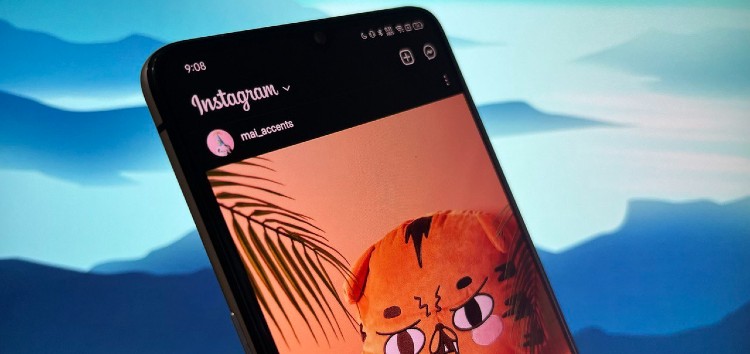Are you satisfied with then frequency/timeliness of OnePlus software updates on T-Mobile/Verizon variants?
— PiunikaWeb (@PiunikaWeb) December 20, 2020
Vote below & read more here: https://t.co/4j4bWnpOKG
New updates are being added to the bottom of the story…
Original story (from December 20) follows:
Regular PiunikaWeb readers know we do keep an eagle eye on software updates from various OEMs as well as the resulting bugs and issues from these upgrades – and OnePlus is among them.
Besides offering industry-leading smartphone prices, OnePlus also owes its massive growth to the enthusiasts who put trust in OxygenOS and even ultimately labeled it one of the best, if not the best Android skin.
Of course, this is subject to debate. And things have especially taken a twist following the recent release of OxygenOS 11, the latest iteration of the custom skin based on Android 11.
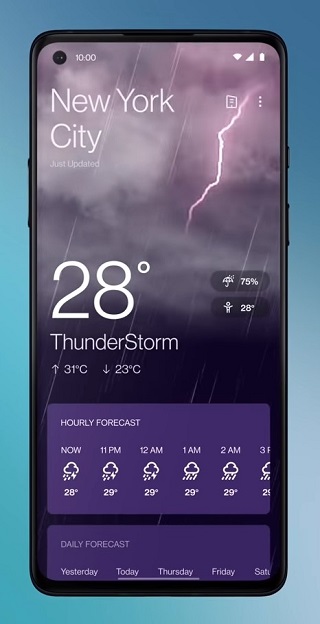
Amid our software update tracking escapades, we end up with some insights into how good or bad various OEMs are when it comes to dishing out new software updates as well as addressing existing bugs and issues.
OnePlus is known to be one of the best when it comes to handling software updates and there’s no denying this, at least for the most part.
As of this writing, for instance, OnePlus 8 and OnePlus 8 Pro are among the few non-Google smartphones that are running the latest stable version of Android 11. If anything, the duo got it first right after the Pixels.
This just about tells you how committed OnePlus is to providing timely software updates to its devices. But as noted earlier, this is only true for the most part.

While this might be good and all, a section of OnePlus users on carrier-locked phones do not get to enjoy these benefits. For years, this was the case with Samsung Galaxy phones.
Unlike their unlocked counterparts, users of Samsung Galaxy devices locked to carriers such as Verizon Wireless, T-Mobile, and AT&T have had to endure lengthy periods of waiting for software updates.
At some point, it would take months between rolling out a major Android OS update to Samsung Galaxy devices sold unlocked in Europe and their carrier-locked counterparts in the U.S.
But recently, things have taken a massive twist. The update to One UI 3.0 based on Android 11, for instance, arrived on Verizon Galaxy S20 units on the very same day it was released for unlocked units in Europe.
T-Mobile only needed a few more hours to begin its own rollout of the One UI 3.0 update to the S20 series, although the firmware has since been pulled back. AT&T is also sailing in the same boat.
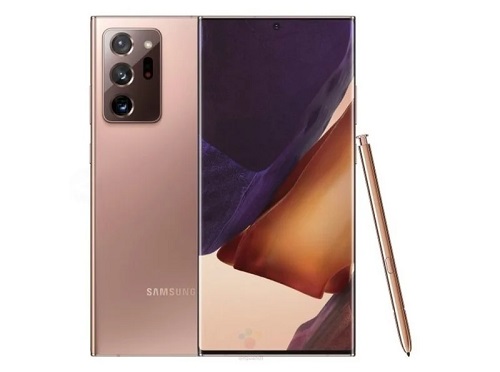
This isn’t your usual dose when it comes to Samsung software updates, but we all agree the OEM has been doing a great job in this aspect.
The company even stepped up to start offering 3 major Android OS updates, something OnePlus has been offering for a while now.
You can even say Samsung borrowed a leaf from OnePlus, but unlike the latter, the Korean company went further and snapped some extra notes from Google’s own software update book.
As noted earlier, carrier-locked devices have typically been characterized by slow software updates. Perhaps this is one reason Google, a staunch timely software updates ambassador, didn’t sell its Nexus devices through carriers.
This, however, changed in 2016 with the release of the first Google Pixel phones. Google and Verizon agreed on the manner in which software would be distributed beforehand.
In a statement shared with Computer World, Google noted that it would be in charge of distributing software updates, thus eliminating the fear that is lengthy delays for carrier-locked device updates.
Google controls the distribution of all OS updates and security patches for Pixel devices. OS updates and monthly security patches will be updated on all Pixel devices (Verizon and non-Verizon versions) simultaneously.
On its part, Verizon also complied, stating that Google Pixels sold through the carrier would be updated to new software updates at the same time as their unlocked counterparts.
Verizon will be releasing operating system and security updates for the Google Pixel at the same time as Google.
Whether Samsung has recently entered into a similar pact with U.S. carriers leading to the speedy release of not just One UI 3.0 update but also monthly security patches to carrier-locked handsets remains unclear.
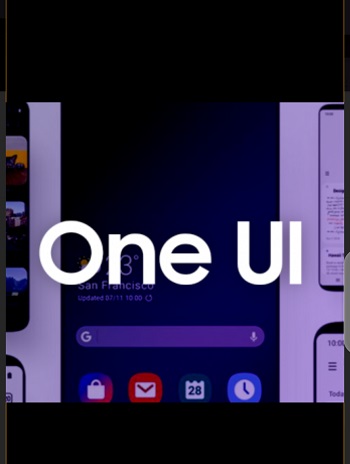
But what is quite obvious is that OnePlus, a company that is synonymous with speedy software updates, is struggling with timely software updates for its carrier-locked devices on T-Mobile and Verizon.
Let’s take a short trip back in time. Android 10 was officially unveiled in early September 2019 and made its way to the then flagship OnePlus 7 and OnePlus 7 Pro a few weeks later in the same month.
However, it was not until later in December — a whole three months later — that the T-Mobile variant bagged this same update to OxygenOS 10 based on Android 10.
As of this writing, it’s now over two months since the unlocked OnePlus 8 and OnePlus 8 Pro received the update to OxygenOS 11 based on Android 11.
But a quick look at the official T-Mobile OnePlus 8 page reveals that Android 11 is still under development.
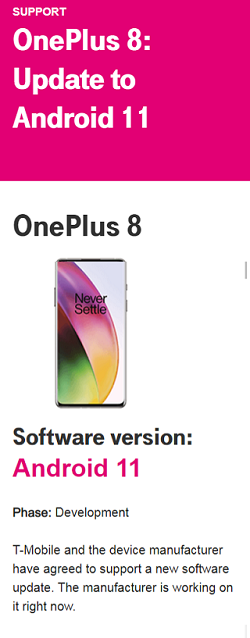
Even more baffling is the disparity between how regularly locked and unlocked variants receive security updates. Unlike the latter, the former variant’s updates are usually subject to lengthy waits.
And this, of course, is spread out across not just OnePlus devices locked to T-Mobile, but also the Verizon variant of the OnePlus 8 as well.
The Big Red’s OnePlus 8, for instance, currently sits on October 2020 security patch based on Android 10, its third software update since arriving on the carrier.
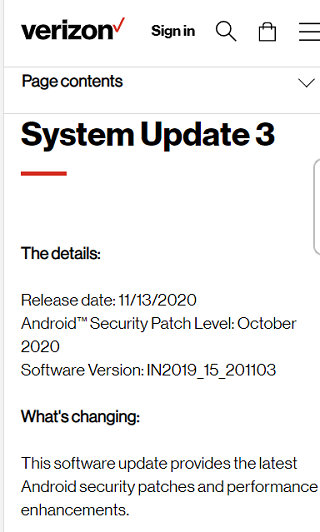
In comparison, unlocked OnePlus 8 is currently on November security patch based on Android 11 and has received more than double the number of updates on Verizon.
Just as I thought things are beginning to level up between unlocked and carrier-locked software updates, it seems as though OnePlus and T-Mobile/Verizon are determined to take a couple of steps back.
The fact that the two carriers have leveled up the software update experience when it comes to locked Galaxy and Pixel devices with respect to their unlocked counterparts suggests there is room for OnePlus too.
I’m not sure what exactly transpired to culminate into simultaneous updates for Samsung and Google phones on carriers and unlocked models, but it’s indeed about time OnePlus follows suit to get its house together.
OnePlus grew to fame partly because of its ability to provide timely software updates. The company shouldn’t have to bend so low just to have its devices on carriers at the expense of this incredible user experience.
Hopefully, it doesn’t have to get worse than it currently is and that the parties involved will sooner or later come to an amicable solution to this annoying issue.
Meanwhile, we’d appreciate if you vote in the Twitter poll embedded below:
Update 1 (December 27)
It’s time to announce the poll results. An overwhelming 88% of those who voted say they are not at all satisfied with the frequency/timeliness of OnePlus software updates on T-Mobile/Verizon variants.
While close to 8% say they are happy, remaining who voted chose the ‘it doesn’t matter’ option. In case you missed the poll, you are encouraged to share your thoughts in the comments section at the bottom of this page.
PiunikaWeb started as purely an investigative tech journalism website with main focus on ‘breaking’ or ‘exclusive’ news. In no time, our stories got picked up by the likes of Forbes, Foxnews, Gizmodo, TechCrunch, Engadget, The Verge, Macrumors, and many others. Want to know more about us? Head here.

![[Poll results out] Opinion: T-Mobile/Verizon & OnePlus ought to get their software updates act together [Poll results out] Opinion: T-Mobile/Verizon & OnePlus ought to get their software updates act together](https://piunikaweb.com/wp-content/uploads/2020/12/OnePlus-8-T-Mobile.jpg)

